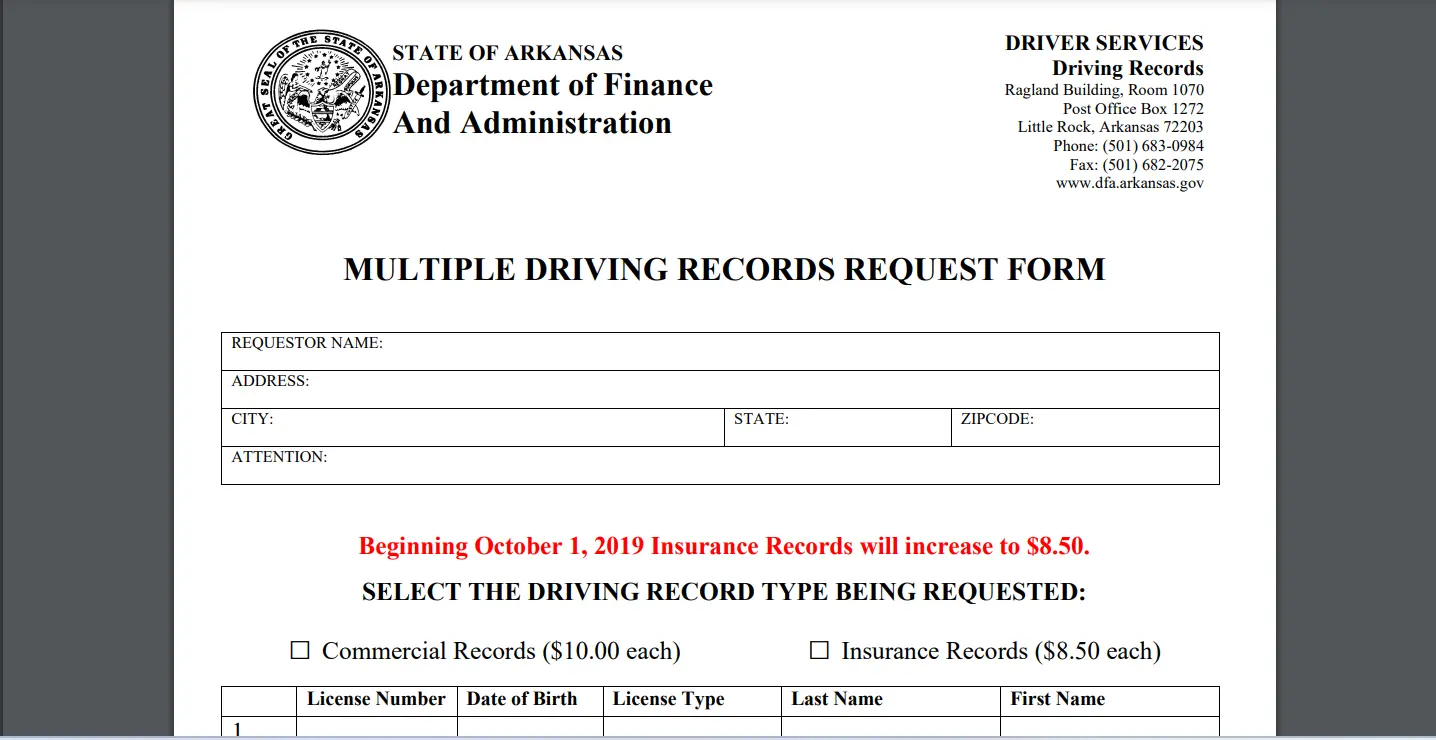Traffic Court Records

Traffic court records consist of all the data obtained from the traffic department of the state. It includes data on all the individuals who are involved in the violation of any traffic rules. The data of all the registered vehicles that run in the state. Traffic channels and tax authority and the rules and regulations that support the traffic system.
The transport authority practices all rules for the smooth running of the state road. The rules and laws surrounding traffic court records are determined at the state level in the United States and can vary depending on the specific jurisdiction.
In Arkansas state, the administration department plays an important role in the traffic system, and it is the custodian of all traffic records of the state. The Arkansas Department of Finance and Administration is responsible for maintaining driving records in the state. Failure to address a traffic ticket by paying the indicated fine or contesting the ticket may result in an increased fine, arrest, and possible jail time. All of these important responsibilities are carried out by the state’s administrative department.
Information involved in Traffic Court Records
Traffic court records can contain a wide range of information depending on the specific case and jurisdiction. It includes all the basic and important info. That will be essential for everyone. In the eyes of the Freedom Act of Information (FOI), A traffic court record serves as a detailed document trail for a traffic violation and its legal proceedings. the administrative body is bound to make this information accessible to the state, this record may contain the following information.
Read More: Methods to access Public Records
Citation Details info.
Citation Number
This is the basic identity of the case. This unique identifier helps track your specific case throughout the court system. It’s usually located on the citation itself. It is specific for each person.
Date and Time of the Violation
This indicates when the alleged traffic offense occurred. It showed the time of the event that took place on the road. This represents the exact time and date of the violation.
Location of the Violation
This pinpoints where the violation happened (e.g., street intersection, highway mile marker). It points out the exact place of the violation.
Specific Traffic Law Violated
It shows in what term the violation occurs. In other words, it explains the reason for the violation or the type of the violation. This details the traffic law you allegedly violated (e.g., speeding at 55 mph in a 40 mph zone, failing to yield at a stop sign).
Driver Info.
Driver’s identity and (License Information)
The driver’s name is as per the national identity card. This identifies the driver involved in the violation, including their full name and driver’s license details (license number, state of issuance). This information specifies the vehicle and driver of the vehicle as well that is involved in the violation.
Vehicle Information
This is a brief guide of information on the vehicle. This section details the vehicle involved in the violation, including the make, model, and license plate number.
Court Proceedings info
Initial Charges
The charges occur at the start of the registration of the case. This outlines the initial traffic violations you were charged with based on the officer’s report. This may vary in every case depending on the nature of the violation.
Pleading Entered
This indicates how you pleaded in response to the charges (guilty, not guilty, or no contest). This is the court statement after the hearing of the violation case.
Court Dates and Transcripts
This is exceptional information. This section lists all scheduled court appearances related to your case. Transcripts, which document what transpired in court, might be available for some or all of these dates depending on the jurisdiction. It is present in a few cases.
Witness Testimonies
If witnesses were present during the traffic stop or accident, their testimonies were documented in the record. This shows the list of witnesses present at the violation or event.
Judgment
The final statement was given by the court at the end of the hearing of the case. This section details the outcome of your case, such as the judge’s decision (guilty or not guilty) or any plea agreements reached.
Fines Imposed by the Court
The amount of fine imposed by the court. If found guilty or entering a plea agreement, this section details the amount of any fines levied by the court. The fine amount varies from case to case.
Points Assessed on Driver’s License
Depending on the severity of the violation and your jurisdiction, points might be added to your driver’s license and insurance rates. It affected the insurance policy.
Special Info.
Officer’s Report
This document details the law enforcement officer’s account of the alleged violation. It might include their observations, the reason for pulling you over, and any field sobriety tests conducted. This shows the cause of the violation, and how the court sees this case,
Crash Reports
If the traffic stop resulted in an accident, there associated crash reports are included in the record. It shows the whole scenario of the case. These reports typically detail the sequence of events, vehicle damage, and any injuries sustained.
Documentation of Any Completed Driver
If you were required to complete any court-ordered driver safety or improvement programs, documentation of successful completion is part of your traffic court record.
Note: The specific information in your record can vary depending on the jurisdiction (state, county, city) and the severity of the offense.
Methods to access Traffic Court Records
The court system that administrative this record consists of different departments that play an important role in the state. Here are three main methods or resources where you can access this record.
Online Search
Court Clerk’s Website
Each county has a separate court clerk website. Most courts have websites with searchable databases for traffic cases. Look for terms like “Traffic Citation Search”. You can search. This is one of the easiest methods to access the record. providing some basic info. Like ( by name, citation number, or case number) you access the data. Example Miami-Dade County, Florida: Traffic Searches – Clerk of the Courts
Visit the Court Clerk’s Office
visit the court clerk’s office in person. They can guide you in accessing your specific citation details. This is the physical method to obtain records. If you don’t have access to the online portal, this is an alternative option.
Address: Ragland Building 1900 W. 7th St. Room 1130 Little Rock, AR 72203
Department of Finance and Administration
P. O. Box 1272
Room 1070
Little Rock, AR 72203–1272
Traffic citation search Specimen of the request form:
Requests for driving records can be made online via the Arkansas Online Driver Record Request System. Requestors will provide the driver’s full name, date of birth, state-issued license number and license issue date, and the last five digits of the driver’s social security number.
To conduct the online search this information is required by the portal.
Citation Number
This is usually the most efficient method and can be found on the citation itself.
Driver’s Name
This might work, but could lead to more results if other drivers share your name.
Case Number
If you have it, you can use it for a more targeted search. Each case has a specific identity number.
Contact the Court Clerk’s Office
You can also call the court clerk’s office for information on traffic court records. Contact the official contact of the legal body for the inquiry of your cases. There may be a fee for accessing traffic court records or obtaining copies.
Phone: (501) 682–7204
Conclusion
Traffic Court Records include all the information and data regarding the drivers and vehicles in the state, on the other hand, it involves the info of all the traffic violation cases data. The administrative body made rules and regulations in the state, in this topic, We briefly discussed the type of information included or presented in the Traffic Court Records. Also, we elaborated on the methods through which you can access this record. We provided the specimen of the record request form that provided you with all the information on how you can easily use the online portal for traffic records.
FAQs
- What Does a Traffic Citation Mean?
A traffic citation, or ticket, is a legal document issued by law enforcement for violating traffic laws. It initiates a court case and outlines the alleged offense.
- How Long Does a Traffic Ticket Stay on Your Record in Arkansas?
In Arkansas, traffic violations typically stay on your driving record for four (4) years. However, more serious offenses or those involving license suspension might have longer reporting periods.
- What Information is Required to Obtain Hawaii Traffic Court Records?
To obtain Hawaii traffic court records, you might need some combination of the following information: Citation number Driver’s name Case number.
- Are Hawaii Traffic Court Records Public Records?
Yes, Hawaii traffic court records are generally considered public records. However, there might be exceptions for specific cases.
- How Do I Pay a Traffic Ticket in Arkansas?
There are several ways to pay a traffic ticket in Arkansas: Online through the court’s website, In person at the court clerk’s office By mail





